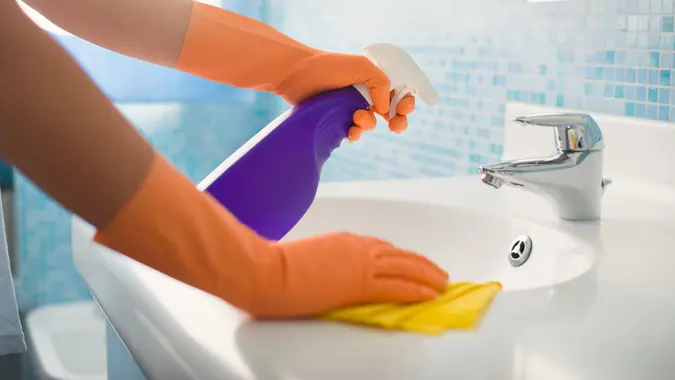2 Things I No Longer Buy Because They’re a Waste of Money

Commitment to Our Readers
GOBankingRates' editorial team is committed to bringing you unbiased reviews and information. We use data-driven methodologies to evaluate financial products and services - our reviews and ratings are not influenced by advertisers. You can read more about our editorial guidelines and our products and services review methodology.

20 Years
Helping You Live Richer

Reviewed
by Experts

Trusted by
Millions of Readers
Whether due to inflation, job loss or other financial pressures, many Americans are finding they need to trim their expenses. Sometimes it’s easy to spot unnecessary purchases; other times, it requires a more honest look at your spending habits.
Two people share what they no longer buy because these purchases waste money, and the additional benefits they’ve discovered that go beyond cost savings.
Changing Shopping Habits
Patty Gutierrez is a 52-year-old former rental manager at the Gilroy Veterans Hall in California, where she recently lost her job due to budget cuts. While she still works as a client service coordinator for a local H&R Block between January and April each year, she’s had to trim her purchases as a result of the loss of income.
Now that her three boys are young adults, she mostly just shops for the next two days’ worth of dinner rather than buying and freezing “just in case.”
“I use mobile pickup the most when grocery shopping, so I order just what I need on the app and don’t have to go into the store for fear of overbuying, especially items no one is asking for. I guess I’m shopping smarter, not impulsively anymore.”
Cleaning Supplies
The biggest change for Patty, however, is that she has stopped buying cleaning supplies such as pet urine deterrent spray, carpet and upholstery cleaning solutions.
“None of the brands I’ve tried deterred my cats from peeing in certain spots or have impressed me with cleaning results,” she said. Instead, drawing from staples she keeps in her house such as Dawn dish soap, baking soda and white vinegar, she can make her own solutions that do a better job with the odor, are more successful in the carpet and upholstery cleaning and are a lot cheaper.
“It was an a-ha, scratching-my-head moment, honestly,” she said. “Why was I spending so much on brand names when DIY mixtures worked better?”
With the loss of income, she saw no point in continuing to spend money on products that barely worked. She estimates she’s saving at least $40 per month just on no longer buying cleaning supplies.
Lessons Learned
Patty reflects on spending habits and offered the advice: “Don’t listen to TV marketing ads” if you want to stop from feeling like you need to buy more expensive things. “Pinterest is my go-to for cleaning advice,” she shared.
She also said she had to teach herself “that brand names are not always my friend.”
Unintended Benefits
Some unintended benefits of no longer purchasing these products include “[fewer] chemical smells, and less headaches and stress about what illness I might indirectly be giving myself using store-bought items rather than using healthier/cleaner solutions,” she said.
No New Things Online
Lisa N., a 39-year-old senior instructor based in Minnesota, recently stopped purchasing anything new online — or from Amazon or Target at all — unless it’s secondhand via Mercari or eBay.
“I used to spend money on household items, clothing and jewelry and electronics accessories from these retailers,” she said.
In addition to working in a profession “that isn’t exactly known for all the money it drags in,” she said that during the 2024 election cycle, she thought Trump’s economic plans “were slated for disaster.”
Lisa added, “Before it was even clear that Trump was taking office, I began saving and shopping with greater consideration.”
She now tries to buy “American everything” to avoid overseas tariffs. She also buys as many household items and even furniture from the local thrift store, and purchases used appliances from Marketplace and garage sales. The changes she has made to her budget so far have saved her “easily $5,000,” she said.
Additionally, Lisa now purchases all her groceries at Aldi instead of the often-overpriced Whole Foods or other supermarkets.
Unintended Benefits
Lisa’s shopping habit shifts are now more in line with her values.
“I love sustainability. Also, it makes me feel good to know that I am rescuing relics of the past from landfills,” she said. “I was surprised by the quality of more dated items. Many things just aren’t built to last anymore, so I consider it a win to find a perfectly working item from 20 years ago.”
Thrifting is proof that “the durability in retail just isn’t what it was.” But even thrifting has its downsides. She noticed that Goodwill has begun marking up its prices “to an unconscionable amount,” so she’s opting for cheaper alternatives like Savers and the ReStore.
Thrifting has become more than just a way of saving money; it’s become her favorite hobby.
Whether out of necessity or a desire for smarter spending, these personal stories highlight how small shifts in buying habits can lead to meaningful financial savings and unexpected benefits, too.
 Written by
Written by  Edited by
Edited by 























